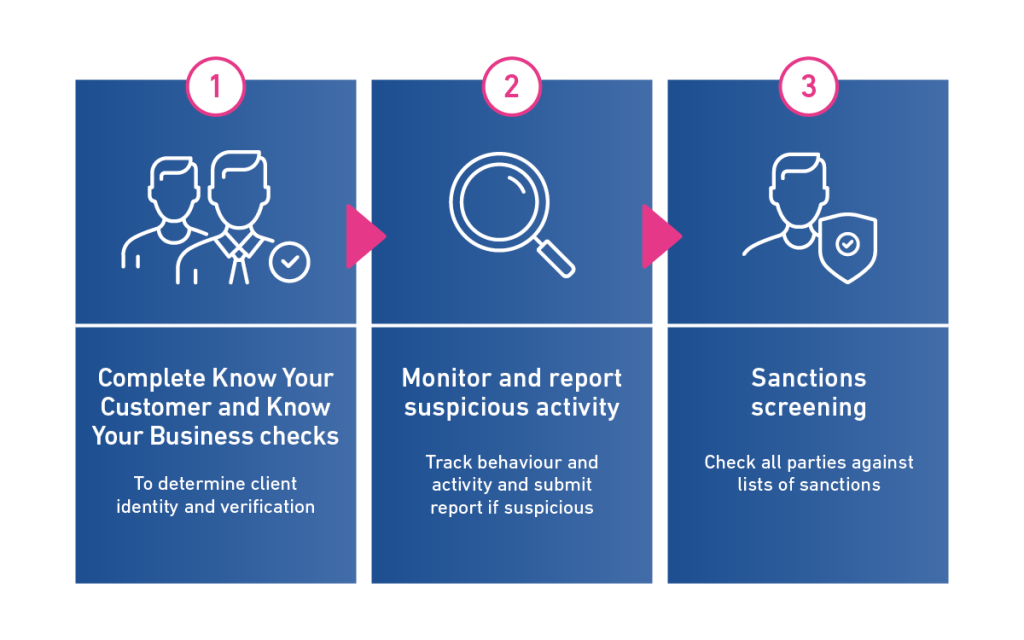For businesses operating within a regulated industry, there’s one due diligence measure you’re likely to be familiar with owing to its high-profile aim at tackling financial crime.
Anti-money laundering (AML) checks help prevent companies becoming caught up in criminal activity, while also complying with money laundering regulations. And it comes with good reason.
An estimated 3% of GDP is laundered every year, which works out at around £1.8 trillion. Looking at this more locally, it’s estimated that money laundering costs the UK economy £100 billion per year.
What is an AML check?
AML checks help to prevent money laundering by confirming that potential customers and businesses are who they say they are, and assessing how likely it is they’re involved in financial crime. For entities who are regulated by the Financial Conduct Authority (FCA), this due diligence is considered essential and is a legal requirement.
The checks are done by identifying and verifying the customer, then obtaining information on the intended purpose of the business relationship or transaction due to take place. This information can then be used to assess their risk level.
For financial providers, the goal of an AML check is to prevent financial crime by ensuring customers are not using their accounts to disguise where funds are coming from or going.
For all other industries, the checks aim is to make sure customers aren’t involved in suspicious financial activity, including money laundering.
Why are AML checks important?
In the UK, AML laws are enforced under the Proceeds of Crime Act 2002, with many different organisations, such as the FCA, National Crime Agency, and Serious Fraud Office working together to counter financial crime. The recent introduction of the Economic Crime and Corporate Transparency Act is also ramping up efforts to tackle financial crime in the industry.
In recent years, alarming statistics have surfaced that highlight the extent of criminal activity amongst businesses. This means AML checks are more important now than ever before.
Between 2011 and 2021, there’s been a 100% rise over ten years in the number of UK companies with non UK-based directors.
In 2021, there were 6,500 UK companies registered that were incorporated with directors who were dead at the time of formation.
Compared to 12 years ago, there are more than three times as many cash-intensive businesses in the UK, which are considered the most vulnerable to money laundering.
How is AML different from other checks?
Businesses can typically put three different checks in place to assess their risk level of being exposed to criminal activity. These are Know Your Business (KYB), Know Your Customer (KYC), and Anti-Money Laundering.
All three are related and designed to ensure that any financial activity and transactions made with them are legitimate and safe. However, the main difference lies in who and what they specifically focus on.
- KYC checks focus on consumers and identifying a named individual. KYC checks are often completed for named individuals within businesses too.
- KYB checks focus on verifying businesses, their owners and shareholders, and suppliers.
- AML checks help ensure that a business or consumer is not involved in financial crime.
Who should undertake AML checks?
Many businesses fall under the UK’s AML regulations, including – although not limited to:
- Accountants and tax advisers
- Banks, credit, and financial institutions
- Cryptoasset businesses
- Estate agents
- Gaming and casino businesses
- Legal professionals
- Luxury goods and art dealers
- Management consultants, auditors, and insolvency practitioners
- Trust providers
Although important in every regulated industry, these checks are a particularly crucial part of onboarding new clients for banks and financial providers. By facilitating millions of transactions every day, banks are at a higher risk of financial crimes. This means regulations are much stricter than in any other industry, stating they must undertake the necessary AML screening to ensure legal compliance.
What are the benefits of AML checks?
Financial protection
AML checks come with a multitude of financial protection benefits.
Firstly, and perhaps most importantly, it helps to prevent businesses from becoming involved with financial crime. From money laundering to terrorist financing and other forms of fraud, AML verification helps flag suspicious activity that could negatively impact your company’s finances.
More than this, businesses who undertake the appropriate checks and monitoring in an automated way can potentially avoid lofty remediation costs that come with traditional manual processes. This also includes the costs that come with a potential loss of business should a company’s reputation become damaged.
Finally, if a business fails to comply with AML regulations they may be subject to fines from the appropriate regulatory bodies. These fines can run into the millions, particularly for repeated or severe violations. It’s not just big businesses which are under scrutiny by the FCA, as part of the Anti-Money Laundering supervision of over 17,000 firms the FCA fined a number of smaller businesses. View the FCA’s 2023 fines.
Regulatory compliance
The UK’s Proceeds of Crime Act 2002 and Money Laundering Regulations 2017 cite AML checks as an essential part of their compliance.
Breaches of AML regulations can result in financial penalties, as mentioned above, as well as criminal charges for both the business and any individuals involved. These charges can range anywhere between being banned from certain business activities to imprisonment.
Reputational protection
Businesses can expect to see their reputation take a hit if they have any association with criminal activities.
Corporate transparency and ethics have rapidly grown in importance to consumers and other businesses. This means that even if there are unproven allegations – let alone findings – of AML non-compliance or financial criminality, your reputation is on the line.
From a loss of trust and market share to a reduction in business opportunities, this risk isn’t worth taking.

How do you conduct AML checks?
AML checks first require evidence of a claimed identity. That evidence will then be checked to ensure it’s genuine and valid before it’s determined whether they are at a high risk of undertaking financial crime.
AML standards can differ in each country, but generally, banks and financial institutions will take the following steps to ensure compliance.
1. Complete Know Your Customer and Know Your Business checks
If checking an individual customer, KYC checks must be undertaken. If checking a business or entity, KYB checks will be necessary. Both, however, have the same goal of determining client identity and verification.
2. Monitor and report suspicious activity
Businesses must remain vigilant in keeping track of their client’s behaviour and activity. Should anything suspicious crop up, they must submit a Suspicious Activity Report (SAR) to the UK Financial Intelligence Unit (UKFIU) in order to adhere to regulatory obligations.
Many regulatory bodies have specific guidelines on what is considered suspicious, such as making several cash deposits or withdrawals over a certain number of days.
3. Sanctions screening
Regulatory bodies insist that all parties involved with a transaction are checked against lists of sanctioned institutions, individuals, companies, and countries. These will be specific to the individual regulators.

What information is needed for an AML check?
To complete an AML check, the pending customer will need to provide the following:
- Name and date of birth / company name and creation date
- Proof of residential address / registered business address
- Official photo ID, such as a passport or driving licence
- Details of their business or place of employment
- Source of business funds
- Relationship between signatories and any Ultimate Beneficial Owners
- Purpose and intended nature of the business relationship
How often should they be run?
The world’s money laundering and terrorist financing watchdog, Financial Action Task Force (FATF) recommends that financial institutions undertake AML checks and customer due diligence measures when:
- Establishing a new business relationship with a customer
- Suspicious about the prospect of money laundering or terrorist financing
- Uncertainty around a customer’s identification information
- Transactions exceed a designated threshold for certain transfers
As well as these specific circumstances, it’s considered good practice to carry out regular transaction monitoring, remediation and customer due diligence to spot any changes in transactional patterns, circumstances or activity that could be deemed suspicious. There’s no definitive time frame attached to this kind of monitoring, instead businesses are advised to make regular checks according to the level of risk a customer may have.
Additionally, if an existing customer’s circumstances change, up-to-date verification and screening should be considered.
How do electronic AML checks work?
From a rise in online payments to support for financial infrastructures, banks and financial services have benefited greatly from technological advances. This type of innovation extends to monitoring transactions and assessing large volumes of data, meaning AML checks have benefited too:
- They cut the time, resource, and monetary burden. Businesses don’t need to store large amounts of physical paperwork anymore, or employ and provide specialist training for staff in order to check and verify documents appropriately.
- They ensure more thorough auditing. Electronic identity checking solutions can be accessed, investigated, and managed much more simply and efficiently than if all that information was stored physically.
- They help provide a better customer experience. When approaching a new service, customers want the speediest, most straightforward way to be onboarded. Electronic AML checks mean they could potentially access the service whenever and where is most convenient for them.
How we can help
Implementing AML checks and ensuring effective due diligence measures are essential for any business who handles financial transactions. Not only does it safeguard your customers and prevent money laundering, but it helps you to stay compliant with AML regulations.
However, knowing exactly what to look for and carrying out comprehensive checks internally can be draining on time, resource, and money.
We can help transform the way you undertake money laundering detection, prevention, and compliance using our expert data-centric approach. Together, we can ensure you uncover suspicious activity and any hidden risks of the businesses and people you work with, to effectively safeguard your business.
To see how we can help optimise your AML processes and minimise the risk of financial crime, get in touch.












